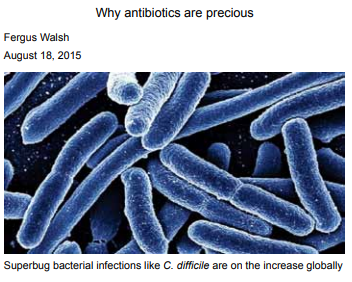Leia o texto para responder à questão.
You need only go back 70 years to a time when a scratch and a common infection could prove deadly. Routine surgery and childbirth could be a hazardous business. Penicillin had been discovered in 1928 by Sir Alexander Fleming, but human trials did not begin for over a decade. The first patient was an Oxford policeman, Albert Alexander, who had scratched his face on a rose bush and the wound became seriously infected (another historical version has him injured in a bombing raid). He was treated with penicillin and his condition rapidly improved, but supplies ran out before he could be cured and he died. By the end of the war penicillin was being widely produced, and other drugs quickly followed - marking the start of the antibiotic era.
So most of us have grown up with these miracle drugs readily available. It’s understandable that patients and some doctors simply can’t comprehend the concept of a pre-antibiotic world. But that is what’s at stake unless the threat is taken seriously.
• Rise of superbugs
Much of modern medicine is now underpinned by antibiotics. Surgery is more invasive than ever: from hip replacements to cancer treatment and transplants - antibiotics are essential to prevent and treat infection. There have been repeated calls on doctors to curb the overuse of antibiotics going back many years.
Whilst it is important that the NHS (National Health System in England) exercises better stewardship of antibiotics, it is worth remembering that this is a global problem that requires global solutions. Superbug infections respect no borders and have spread from continent to continent with ease. This is a serious concern because many developing countries have far poorer controls on antibiotic use.
• Misuse
Last year the World Health Organization found that some antibiotics could be bought legally over the counter in 19 out of 43 European countries surveyed. Then there is the widespread misuse of antibiotics in agriculture, in farmed animals and fish. More antibiotics are used in livestock production than for human health and there is widespread concern about the use of long-term, low-dose antibiotics in animal feed in countries like the US, China and India.
Part of the problem is due to simple evolutionary pressure: bacteria are constantly evolving, and resistant strains emerging. This means there is a constant battle to stay ahead of the germs. But developing new antibiotics has proved hugely difficult - it’s nearly 30 years since the last new class of antibiotics came on the market.



















